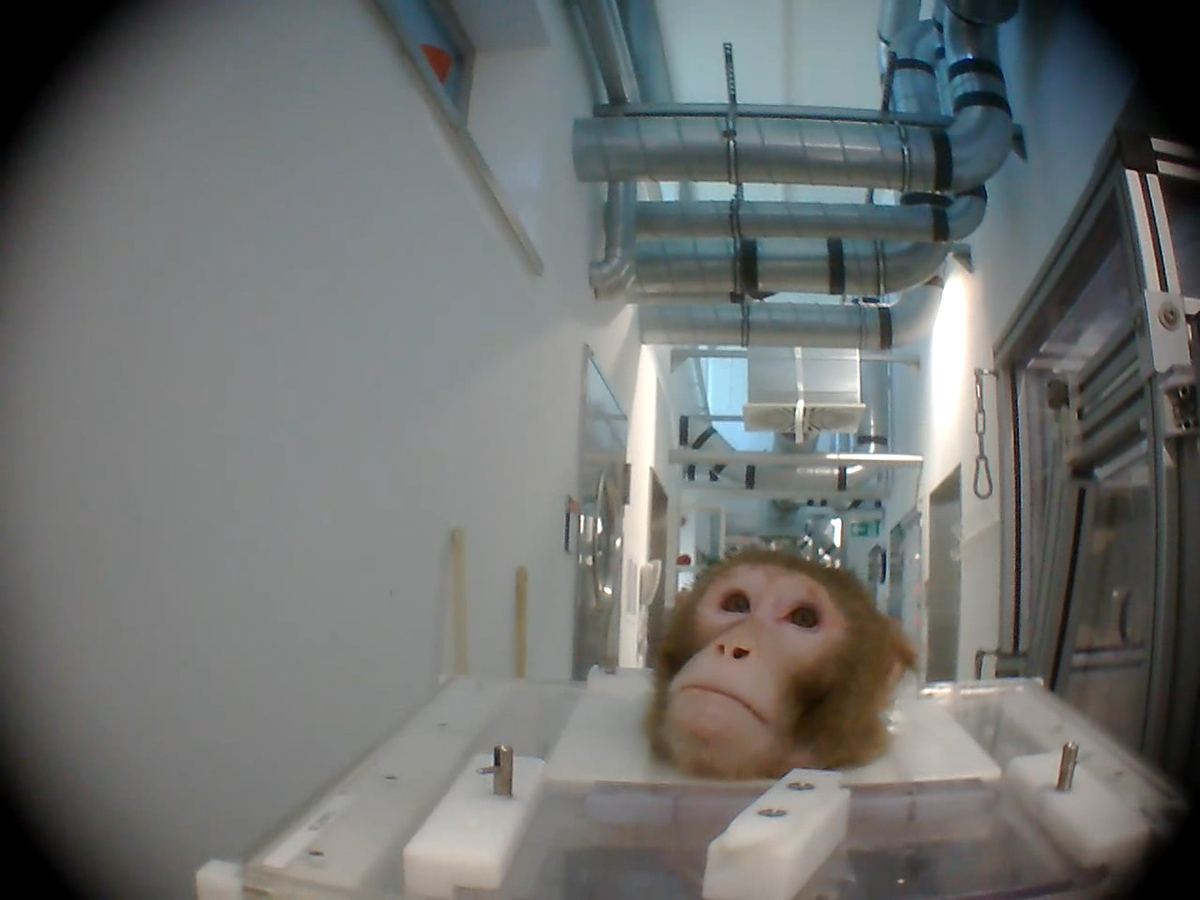

Silabe, an establishment within the University of Strasbourg, at the heart of the international trade in monkeys for animal experimentation
One Voice has seen information according to which more than a thousand long-tailed macaques have been imported year after year and forwarded to our neighbours elsewhere in Europe.
Photo: Cruelty Free International/SOKO-Tierschutz
France at the heart of a secretive and cruel trade
For many years France has been, via the ‘Silabe Platform’, a staging post for – and moreover a place for experiments on – thousands of primates from Mauritius and Vietnam en route to laboratories in Germany, the United Kingdom and Italy, such as Accelera, Aptuit, Bayer AG, Covance and Merck, where they spend the rest of their sad lives subjected to experiments.
It is likely that some of the monkeys also undergo tests in France, after very probably arriving at Roissy in the holds of Air France planes. Silabe has already been at the heart of controversies, revelations, demonstrations and campaigns, in particular by other French associations, which had found themselves up against a brick wall[1].
Silabe used to be run by a private association benefiting from ministerial funds and controlled by the University of Strasbourg. It is now part of the University and takes the form of a national public educational establishment of a scientific, cultural and professional nature. The primates involved are often very young. Many of those from Mauritius are barely a year and a half old. Small vulnerable babies, weighing about two kilos are sent in ‘batches’, as cargo in transit crates, far from the nurturing and protection of their mothers. The length of the journeys and the conditions of transport are terribly distressing for the infant monkeys : stress, fear etc. And what is waiting for them? Being restrained on cold tiled laboratory benches, having holes cut or drilled into their skulls, electrodes planted into their brains, or having chemicals and drugs forced into their bodies, poisoning …. As monkeys are very valuable to researchers, the survivors are sometimes sold to other laboratories for yet more years of experiments. Finally, euthanasia or slaughter awaits them, with no glimpse of another life, no retirement.
A reduction in the number of animals used in research: utopia?
European law stipulates that primates used for scientific purposes should come exclusively from breeding establishments or colonies maintained with no introductions of animals taken from the wild; This applies as from 10 November 2022 for all the members of the EU, including France. It, therefore, strengthens the rules applying to the trade in monkeys. But who is going to monitor it, especially in the countries where the animals are captured and bred for export?
The European regulations also stipulate that fewer animal procedures must be carried out in research in general. But what is likely to happen?
The continuing lack of transparency
Moreover Silabe is only one stage in these transfers, among so many others. Year after year the figures for the use of animals in research in France stagnate at an unbelievable level! Looking into the issue there is an obvious lack of transparency.
Another question that needs to be answered : although the trade in primates from Vietnam and Mauritius to Europe is allowed, why is France in general and the Silabe platform in particular a staging post?
We have written to Frédérique Vidal, the Minister of Research, to bring this matter to her attention. We and our partner Action for Primates (United Kingdom) need your support! Please join us in writing a letter to the Embassies of Mauritius and Vietnam to bring an end to the exporting of monkeys to France for pointless experiments. And please sign our petition for total transparency about animals used in experiments, the financing of non-animal alternatives and the systematic and exclusive use of such alternatives where they exist!
[1] Campaigns and demonstrations
- Rallies organised every year since 2015 by Pro Anima, Animalsace, Fight for Monkeys, Code Animal and Reporters for Animals Only
- Code Animal has run a campaign on monkeys in quarantine and published photos: https://www.code-animal.com/code-animal-donne-un-visage-aux-singes-detenus-a-niederhausbergen/ & https://www.code-animal.com/fermons-le-centre-de-primatologie-de-luniversite-de-strasbourg-a-niederhausbergen/
- Animal Testing has also published an article on Air France and the transport of monkeys mentioning the centre: https://animaltesting.fr/enquetes-transport-aerien-animaux-laboratoire-roissy
- Pro Anima has been campaigning for several years on the activities of the centre. It has asked ADUEIS/SILABE for documents, in vain. Response from CADA (the French government department dealing with Freedom of Information requests) to its complaints: https://cada.data.gouv.fr/20173109/. The association applied to the Administrative Court for the documents and contacted the European Court of Auditors and the French Court of Audit, which conducted an investigation.